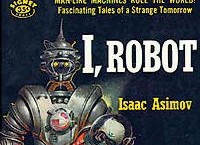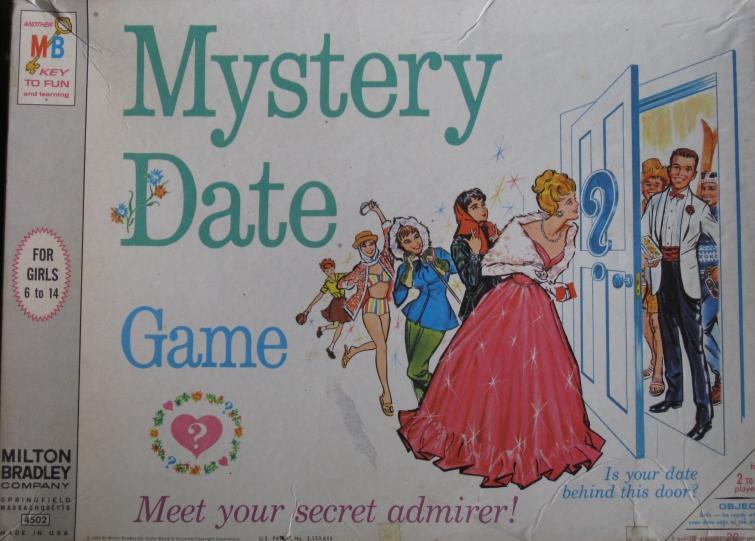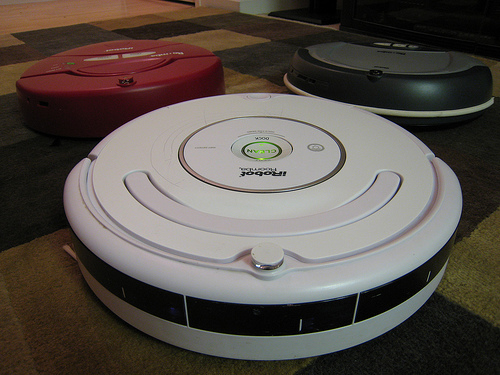Skepchick Book Club: I, Robot

Short stories and sci-fi are two of my favorite kinds of literature, so I was excited this month to read I, Robot by Isaac Asimov. Reading this book is like opening up a time capsule and it’s interesting to note not only how our views on robots have changed but also our views on the role of men and women in society. The book is a series of short stories narrated by Dr. Susan Calvin, a robopsychologist who is giving an interview about the history of robotics as she understands it. There is a wide range of themes, from Robbie the robot nanny to the eventual takeover of humanity by robots. One of the major themes of the book is the Three Laws of Robotics and how they can be interpreted so that a robot may not necessarily follow them.
Overall, I enjoyed this book, although I did bristle at how some of the females were portrayed in the book. For example, in the story “Liar,” the successful woman is only interested in getting her dream man, while the successful man is interested in getting promoted at work.
Join us in the comments to discuss how you feel about robot takeovers, Asimov’s character development, and how fun it is to see predictions about future technology (sky cars!).

Some of the stories I enjoyed the most are:
- “Robbie”: A robot who can act in all ways like a human (except he can’t talk) is a nanny for a little girl. Her nagging mom is technophobic and convinces her husband to trade it in for a dog. Of course, the girl is devastated and doesn’t want a stinkin’ dog (poor thing!), and in the end she finds her robot and gets it back. Although she presumably loses interest as a teenager. I liked this story because I’m a sucker for heartbreaking robots (see: Teddy fromA.I.)
- “Reason”: A robot on a remote space station reasons that there is a robot creator despite what the humans who assembled him have to say. It’s a good example of how you can use reason and logic to justify anything (in absence of what you think of as convincing evidence).
- “Little Lost Robot”: A robot has been modified so that only obeys half of the First Law (so it cannot harm a human but it could, through inaction, allow a human to come to harm). However, the robot’s master told it to “get lost” and so it did, among a group of identical robots, until the robopsychologist was able to determine which one it was. I liked the puzzle of the story and how they tricked the robot into revealing itself.
- “Evidence”: A man running for office has never been observed to eat or drink, leading some to believe that he is in fact a a robot. In the end, he punches another man in the face, thus proving that he is a man. Until Susan Calvin figures out what really happened.

Truthfully, I didn’t mind the robot takeover that much. As long as I wouldn’t have to work as a slave and I got to retire early, there could be benefits! I would finally have enough time to keep my house clean. Better yet, robots would clean it and I would have time to read books and pursue other interests! (Note: I am writing this while my dishwasher is cleaning my dishes and my Roomba is vacuuming the house. I just need one of those robot cars and I’ll be all set.) But hey, that’s just my opinion, it’s definitely not a popular one.
This Month’s Recipe:
I was a bit lazy this month, so I made my Cherry Dump Cake (it was a hit!). So instead of posting a recipe, please enjoy this old, creepy video clip about pizza! P-I-Z-Z-A.
Next Month’s Book Club:
We are going to be discussing Subliminal by Leonard Mlodinow. The Skepchick book club always gets posted the day after the Boston Skeptics’ Book Club, so I’ll put up a post on Sunday, November 4th around 11 am. So put on your tinfoil hats and join me there!






I just finished re-reading this book for probably the 5th time. I first read it when I was about ten. Now I just have it in a particular travel bag, and occasionally re-read it when I’m out and about. After this past reading, I’ve decided to order some more of the robot series by Asimov. I suspect they’re all be equally as interesting.
Although every chapter is interesting, I find “Evidence” to be my personal favorite. The character of Byerley is great. He embodies the attributes that we both love and hate about politicians, and the question of his human-ness is always just a little bit iffy. when he finally decks the “protester” near the end of the chapter, you’re just about finally convinced. But then you’re not, and you see why at the very end of the chapter. I like the emotional roller-coaster that Asimov takes you on with this particular story.
Highly recommended. Great author and great book.
Have you read “The Complete Robot” yet? That contains all of his robot stories, including the Susan Calvin storyline.
I haven’t read much criticism of Asimov, so I don’t know if anyone else has commented on it, but it occurred to me while reading Asimov that both of his two great imaginings (the three laws of robotics stories and the Foundation) are both to some extent almost anti-science science fiction. Both of them start off with the attempt to reduce a subset of the “soft sciences” (history with the Foundation, and morality with the robot stories) down to a set of precisely defined scientific rules and principles. And in both series, there is then a prolonged dissection of all the ways in which such an endeavour is doomed from the outset.
I have to agree his treatment of history and morality themes is somewhat reductive. Also I feel that Asimov romanticises and sentimentalises technology. That is not to say Asimov’s works are not an enjoyable read overall.
Sure they’re reductive. But like I said, he seems to go to great length to explain why something as reductive as the three laws, though seemingly reasonable, end up being pretty much useless as a substitute for real-life, complex human thought.
I think there were lots of social scientists in Asimov’s day who seemed to believe that human behavior could be reduced to some kind of theorem, and it seems to me that a whole lot of his work is dedicated to showing why they were wrong.
I totally agree on the first part, but I’m not so sure about the second – if his work was dedicated to proving the simplifications in social science wrong (fuck aliteration). The Foundation cycle – maybe, I, Robot – not so much. The problem I have with this is that Asimov’s robots seem waaay too human – “improved” humans but still modelled very much after the original.
I’ve been thinking about David (Prometheus) recently – and just how impossibly ingenious he is as a character (seriously, deserving his own film) and how gloriously he is devoid of any sentimentality, how truly he is the OTHER. I wonder how much of David’s malice is actually read into his actions by the audience, because we never really get any explanation (thank goodness!) whether David has any morality/ethics. Except for when Wayland says David does not have a soul. For all we know David may be just running a program with one clear objective.
Now, the robots of Foundation – even if their morality is a set of simple rules (which as you said, fail), seem to be acting on a much higher understanding of humanity’s purpose (whatever you wish to call it).
Now, I’ll have to re-read the books again. Damn.
David was the only reason to watch that soul crushingly disappointing movie.
I enjoyed the book, but I did find it funny that technological advancement was reversed. They had to build giant room-sized computers to crunch numbers, yet regular mass-produced robots had personality and the ability to reason.
I think it’s pointless to overanalyze Asimov’s early science fiction. It wasn’t written with any other purposes in mind but the joy of creation and the overwhelming urge to have John Campbell publish his stories in Astounding, the leading magazine of the era. Asimov goes into great lengths about this in his biographical writings. He also pleads an almost total ignorance of women’s motives at that time, and apologized for their absence in his early stories many times. It’s interesting to note that by the 1940’s, some of the most compelling characters in his fiction are women – especially in the later Foundation stories and the Naked Sun.
Asimov was a curious figure when seen in feminist terms. On the one hand, he did consider women his equals from the start of his career. Once he became more established, he met many strong women that confirmed this conviction, including his own wife, and many of his editors and writer colleagues. He often stuck up for women’s rights, along with having other very progressive views. On the other hand, he was constantly flirting and sexually kidding around with women in a foxy grandpa sort of way – probably quite tiresome on the face of it.
Today, we can see such behavior as sexist, but he seemed to be unaware that he was offending anyone. But it’s worth it to read his autobiography, and witness that he was almost always first to blame himself in an embarrassing situation or social faux pas, and more aware of his own flaws than anyone, despite being a comically raging egotist. He might well agree with our outlook on such things today.
For the most part, I liked Susan Calvin. It was just in “Liar” that she displayed some tired gender roles.
I’m not trying to be too critical of Asimov, and I haven’t read his biography nor do I know much about his views of women. But as a feminist it’s easy for me to pick out attitudes from his time in his writing, which is to be expected. I’m more critical of modern writers who do that.
Fair enough. I was reacting more to other comments on this page than to your questing presentation. Thanks ever so much for rekindling interest in this great author.
There’s an interesting story about Asimov. He was at a scientist’s conference in the early 1960’s, and attended a seminar about “What Should a Scientist Consider as the Ideal Wife.” During the talk, he said loudly. “or husband!” – sticking up for the two or three woman scientists in the crowd. To his surprise, the other attendees immediately assumed he was making a homosexual reference – not even the woman scientists seemed to get it. That’s the level of blindness that he made his way through. By those standards he was a saint – but still a very human and admittedly flawed character by today’s.
I just got the second volume of his autobiography, In Joy Still Felt. A rare book now, but every page is a fascinating account of the professional writer’s life. I think he ended up publishing, what, a quarter of a billion words? Simply unstoppable, until AIDS from a tainted transfusion brought him down.
It’s been a while since I read the book.
I do recall enough of it to know that “Reason” was rather trippy (for lack of a better term).
I think certain humans follow a similar line of thinking.
“Evidence” was great, IMO.
I didn’t really except the ending!
As for robot takeovers, I’m not too worried about one happening. It makes for good story telling, but I think we may be safe. At least, for now…
Predictions of future technology are rather hit and miss. And the sometimes ignore practicality.
For example, flying cars are often longed for. Yet people rarely give thought to the fact that many drivers barely can cope with traveling in 2 dimensions, let along 3! Traffic related deaths with flying cars would, IMHO, be quite high. I prefer cars like KITT (needn’t be the same make and model, though).
Other examples fell short of the reality. We’ve seen it in Star Trek and other stories that feature computers. They are often shown as large, bulky units. They rarely show anything similar to the current trend (a book entitled “The Computers of Star Trek” gives a great analysis of this).
Maybe flying cars would be feasible if they were controlled by robots? But you’re right, air traffic controllers can barely keep control over the skies as they are right now. Also, air-rage would be horrendous.
The Gripester obviously groks Asimov. Anybody who can characterise Asimov’s writing as anti science is reading it wrong.
I first encountered Asimov in 1971 and the effect on my brain was something akin to literary crack cocaine. I devoured the Foundation Trilogy in a single glorious bender, devoting every waking moment to reading. Reading in the shower was a trick!
All too soon I exhausted Asimov’s first wave of SF including all of the Robots and moved on to other things.
Although I enjoyed “Robots of Dawn” when it came out in the 80’s, I gave the Foundation prequels and sequels a miss. I wonder whether the second wave is truly canon? I mean to say, Gaia, FFS?
As to Asimov’s treatment of women IRL, I think he treated his first wife very poorly, in common with many of the Wunderkind type. See also Einstein, John Lennon and others.
If you want to know what Asimov really thought about the relationship of Science to Humanity, read “The Last Question”, which was his all time favorite.
I won’t spoil it for you, but if the message is not science positive, I don’t know what is!
Read, enjoy!!